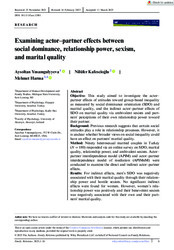Examining actor–partner effects between social dominance, relationship power, sexism, and marital quality
| dc.contributor.author | Ymamgulyyeva, A. | |
| dc.contributor.author | Kafesçioğlu, Nilüfer | |
| dc.contributor.author | Harma, M. | |
| dc.date.accessioned | 2023-11-01T06:38:04Z | |
| dc.date.available | 2023-11-01T06:38:04Z | |
| dc.date.issued | 2023-04 | |
| dc.identifier.issn | 0197-6664 | en_US |
| dc.identifier.uri | http://hdl.handle.net/10679/8909 | |
| dc.identifier.uri | https://onlinelibrary.wiley.com/doi/full/10.1111/fare.12881 | |
| dc.description.abstract | Objective: This study aimed to investigate the actor–partner effects of attitudes toward group-based inequality as measured by social dominance orientation (SDO) and marital quality, and the indirect actor–partner effects of SDO on marital quality via ambivalent sexism and partners' perceptions of their own relationship power toward their partner. Background: Previous research suggests that certain social attitudes play a role in relationship processes. However, it is unclear whether broader views on social inequality could have an effect on partners' marital quality. Method: Ninety heterosexual married couples in Turkey (N = 180) responded via an online survey on SDO, marital quality, relationship power, and ambivalent sexism. Actor–partner interdependence model (APIM) and actor–partner interdependence model of mediation (APIMeM) were conducted to examine the direct and indirect actor–partner effects. Results: For indirect effects, men's SDO was negatively associated with their marital quality through their relationship power and hostile sexism. No significant indirect effects were found for women. However, women's relationship power was positively and their benevolent sexism was negatively associated with their own and their partners' marital quality. Conclusion: Our findings help develop a more comprehensive understanding of how the political, social, and personal aspects of our lives are connected with one another. Implications: Our study points to the importance of exploring the topic of men's and women's views toward social inequality and its effects on their close relationships in clinical practice and relational education. | en_US |
| dc.language.iso | eng | en_US |
| dc.publisher | Wiley | en_US |
| dc.relation.ispartof | Family Relations | |
| dc.rights | Attribution 4.0 International | * |
| dc.rights | openAccess | |
| dc.rights.uri | https://creativecommons.org/licenses/by/4.0/ | * |
| dc.title | Examining actor–partner effects between social dominance, relationship power, sexism, and marital quality | en_US |
| dc.type | Article | en_US |
| dc.description.version | Publisher version | en_US |
| dc.peerreviewed | yes | en_US |
| dc.publicationstatus | Published online | en_US |
| dc.contributor.department | Özyeğin University | |
| dc.contributor.authorID | (ORCID 0000-0001-7683-240X & YÖK ID 111447) Kafescioğlu, Nilüfer | |
| dc.contributor.ozuauthor | Kafesçioğlu, Nilüfer | |
| dc.identifier.wos | WOS:000965200000001 | |
| dc.identifier.doi | 10.1111/fare.12881 | en_US |
| dc.subject.keywords | Dyadic analysis | en_US |
| dc.subject.keywords | Marital quality | en_US |
| dc.subject.keywords | Relationship power | en_US |
| dc.subject.keywords | Sexism | en_US |
| dc.subject.keywords | Social dominance orientation | en_US |
| dc.identifier.scopus | SCOPUS:2-s2.0-85152022761 | |
| dc.relation.publicationcategory | Article - International Refereed Journal - Institutional Academic Staff |
Files in this item
This item appears in the following Collection(s)
Share this page




